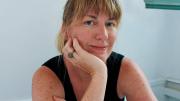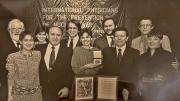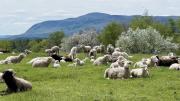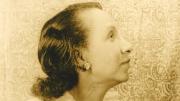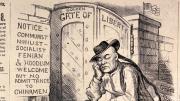It may seem odd that Maggie Shipstead ’05, whose third novel, Great Circle, arrives this spring, didn’t grow up wanting to be a writer. The current Los Angeles resident—born in Orange County, but peripatetic for a few years in-between—remembers reading as having a more prominent role in her life than writing. Her mother, she says, sometimes suggested otherwise, “Like, ‘Well, maybe…you’ll be a writer one day,’ and I was really resistant to that idea.”
Harvard was a clearer path: her father attended the College, and her mother the Graduate School of Education. Shipstead says she entered as an “aggressive” high-school graduate, but the environment caused some culture shock. She started two days after 9/11, and still recalls the palpable sorrow hanging over fellow students, many of them East Coasters. With time, she learned to temper her competitiveness and immerse herself in the academic experience. “My freshman year I got a B, and I’d never gotten even an A- in high school, and my parents were like, ‘Good for you! Take it down a notch! Have a good time for once!’”
She briefly considered concentrating in anthropology, but one introductory class changed her mind. “It was very difficult for me to not be judgmental,” she says, laughing, “which is a basic tenet of that field.” She switched to English and began picturing an academic career. That changed when, on a sophomore impulse, she took a creative writing class with novelist and Radcliffe Institute Fellow Lan Samantha Chang (now the program director of the Iowa Writers’ Workshop). A junior-year workshop with novelist Zadie Smith led to writing a short-story anthology as a senior thesis. That year she also co-wrote the Hasty Pudding Show, her “first major experience” of having something “consumed by more than just a workshop, an adviser, or my mom.”
Still, writing as a career remained amorphous and uncertain. “I couldn’t fathom writing a novel, but after I graduated I really didn’t know what to do with myself,” she admits. Briefly, she worked at a law firm, “because when you’re verbal, everyone tells you to go to law school, but I knew that wasn’t for me either.” When writing called to her again, she decided to go to the source, and applied to the Iowa Writers’ Workshop. She was accepted, and her time there felt like “two years of life falling into place.”
Within a few years of earning her M.F.A. and winning the Wallace Stegner Fellowship at Stanford, Shipstead produced her first novel, Seating Arrangements (2012). It portrays a wedding on Nantucket from the father of the bride’s point of view, as he grapples with middle age and the autumnal male desire for a young bridesmaid: “a WASPy book about a WASPy subject,” she says. Seating Arrangements, Shipstead recalls, posed the interesting challenge of writing crowds, which prompted her to revisit Virginia Woolf’s To the Lighthouse and Michael Chabon’s Wonder Boys to see how those authors portrayed the mechanics and dynamics of party scenes. Her second book, Astonish Me (2014), “a Cold War ballet drama,” featured a young dancer who will never be a prima ballerina, and her fling with a Baryshnikov-like Soviet defector. An interest in ballet, inherited from and shared with her mother, was the catalyst.
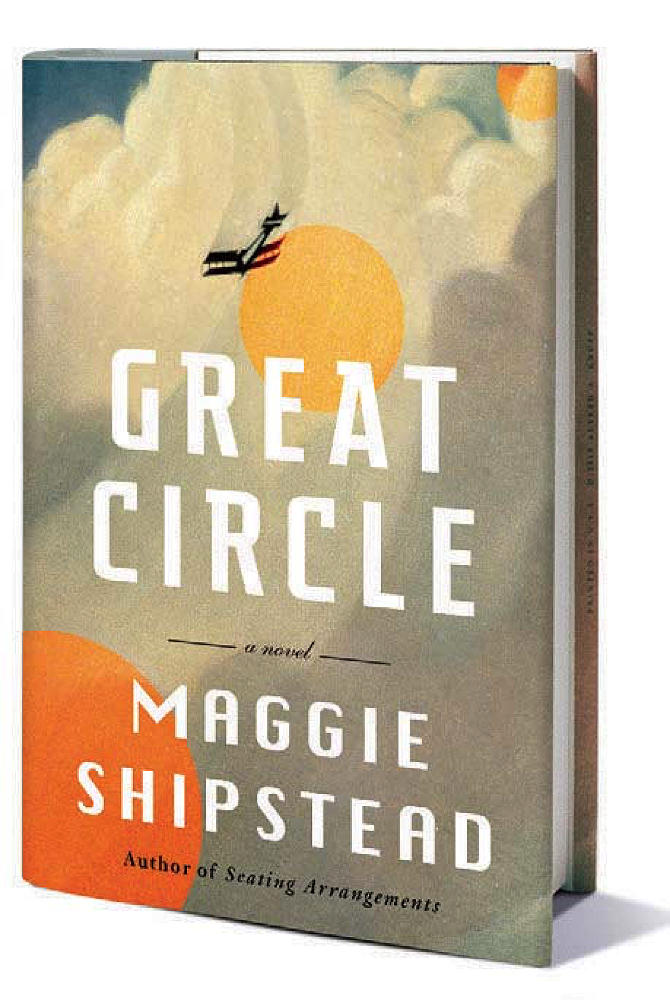
Her new work, Great Circle, goes off in yet another direction—or rather, two directions. A time-spanning novel, it switches back and forth between a pair of characters: Jazz Age aviatrix Marian Graves, and Hadley Baxter, a young twenty-first-century actress set to play Ms. Graves in a biopic. Marian and her brother are infant survivors of a shipwreck. Adopted by their artistic uncle and brought to the Midwest, Marian soon discovers a love of flying. Basking in the strange fame that female pilots briefly enjoyed then, she sets out to circumnavigate the globe from pole to pole, but disappears. Likewise, Hadley deals with the perquisites and limitations of fame foisted upon young actresses, and finds in Marian an inspiring figure of independence and self-identity.
Shipstead remembers being inspired many years ago by a statue of the 1930s New Zealand pilot Jean Batten—and certainly the legend of Amelia Earhart looms over the character of Marian Graves—but it took a while for Great Circle’s ideas to gel. Her previous novels stemmed from short stories she’d written, but this was a work of spontaneous generation. Despite all her literary training, for Shipstead, writing still distills down to the homuncular approach of summoning one line at a time. “I’m not a planner,” she says. “I don’t outline. I start something and hope for the best. Whatever I’m working on just dies if I try to plan it.” She quotes a saying in creative writing that fits this notion: “It’s like driving at night: you don’t need to see the whole road, you just need to see around the next curve.”
Yet some planning and research were involved, as well as personal experience. Shipstead is a long-time traveler and travel writer, with bylines in Condé Nast Traveler, Travel + Leisure, Outside, and other publications; she has visited Tonga, Botswana, Patagonia, and many points in between (and including) the Arctic and Antarctica. For the book’s flight parts and paths, she consulted her brother, who served as a pilot in the air force. The novel also features tidbits on antiquated methods of childbirth and child-raising, the mechanics of ship christenings, smuggling armaments, and more. “I try as hard as I possibly can to get things right,” she explains, without resorting to, as she puts it, “dumping the notebook.”
Shipstead spent two years writing a first draft. Her final draft totaled about 980 pages, which were edited down to a slimmer 608. In her writing process, she draws inspiration and lessons in particular from her time with Zadie Smith and another instructor, writer Tobias Wolff, at Stanford. Smith provided tough love and “rigorousness” with manuscripts, while Wolff offered “generosity as a reader.” She sums up: “That’s a balance, I guess: trying to be rigorous and generous with myself.”
